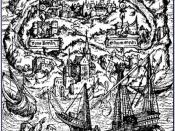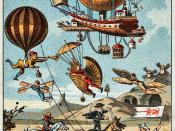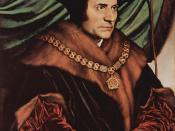Human societies are brutal in their judgment. One faux pas and society effectively shuns an individual. For this reason, public figures are forced to adopt a public persona, a heavily guarded fortress of orthodoxy, if they would like to fit in, or moderated nonconformity, if they would like to stick out. During the early modern European period, nonconformity often resulted in harassment and political discrimination. Private opinions were to remain private. Sir Thomas More was, for the majority of his life, an example of the first faction, the conformists. An English Rennaisance humanist, More held many government offices, including that of Lord Chancellor. These positions are testament to More's very conformist points of view.
In 1516, More published a literary work titled Utopia, Greek for "nowhere", in which a fictional character by the name of Raphael Hythloday discusses his travels to an island called Utopia. This work is divided into two books, the first of which describes European society's ills and the second of which describes the ideal society, Utopia.
His radical Utopia, very radically different from contemporary England, stands very staunchly in the face of his very conservative policies. The idea of a society devoid of currency, riches, property, and personal pride were contradictions to the values instilled in the population by the monarchy, and continue to be contradictions by today's standards.
So how may More's Utopia be approached? Is it the first of a new kind of fantasy escapism? A philosophical inquiry into the power of reason as a guiding force of society à la Plato's Republic? A satire on arrogant local customs and prejudices in the vein of Swift's Gulliver's Travels? Rather, More's political situation leads us to believe that it is in fact a disguised political treatise regarding social reform.
After reflecting on a society's terminal...


